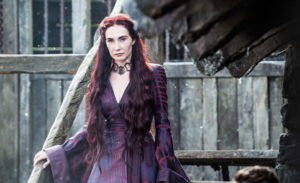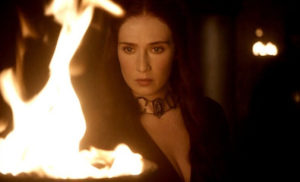 Let me sum up what we got from the first episode of the new and highly anticipated Game of Thrones season: Jon Snow is dead… or is he? The truth is we still really don’t know. Surprisingly, very little happened in this episode, leaving most of our cliff hangers from last season with not much resolution. I mean sure, we had the Sand Snakes killing their way to the throne of Dorne, and Brienne riding in to save Sansa and Theon at the last minute, but aside from that we didn’t get much more than set up for the rest of the season. Except for one very peculiar scene tacked on to the end of the episode which could mean everything to rest of the story.
Let me sum up what we got from the first episode of the new and highly anticipated Game of Thrones season: Jon Snow is dead… or is he? The truth is we still really don’t know. Surprisingly, very little happened in this episode, leaving most of our cliff hangers from last season with not much resolution. I mean sure, we had the Sand Snakes killing their way to the throne of Dorne, and Brienne riding in to save Sansa and Theon at the last minute, but aside from that we didn’t get much more than set up for the rest of the season. Except for one very peculiar scene tacked on to the end of the episode which could mean everything to rest of the story.
Go ahead and let out your cry of disgust. “Eww!!” Good now? Okay. Now let’s examine what exactly happened to the Red Woman. The practical is pretty straightforward- whatever that jewel is that adorns her neck is prolonging her life and providing her with an outward beauty. The implications, however, are quite complex. Rather than this being simply a scene to weird you out with some strange fantasy magic, this could actually be a critical turning point.
Jonathan Swift, author of Gulliver’s Travels and innovative satirist, once wrote about a beautiful young woman returning to her bedroom and getting ready to sleep, “Piece by piece she takes off many of the physical features that she wears to hide what she really looks like- her eyebrows, a crystal eye, even her hips.” The poem, entitled A Beautiful Young Nymph Going to Bed, was no doubt on GoT author George R.R. Martin’s mind when he envisioned Melisandre. There isn’t some great lesson to be learned by the poem, either; it simply dissects the superficial and leaves you with the truth. (Seek out the poem. Though it’s decidedly grotesque, I’m guessing you won’t have a problem with it since you watch GoT).
Now that we see behind Melisandre’s veil, it gives us insight into what may become of a world where death is as common as dinner. Jon Snow lies cold as ice on a table. Melisandre has a fire that sustains her. What is to come in our story will likely rely on the conjoining of these two things. After all, this is A Song of Ice and Fire. The scene of Melisandre going to bed is tough to watch for many reasons, but visually it is very telling. The story being told lies wholly in her facial expression. She seems to be surrendering– to fate, or choice, or something. But it indicates that a time has come for something to break.
That’s what we’ve been waiting for isn’t it? We are over five books and TV seasons into this story. Isn’t it about time something breaks? If you examine the heart of the story (and a good place to start is my State of Thrones set up to this season) you understand that Jon Snow’s story isn’t over. He may be dead, but dead things tend to not stay that way in Westeros, whether physically or metaphorically. The Stark children are the truest hope for the realization of what started this whole story- Ned Stark’s desire for justice. Arya plays a part in that. Sansa does too. Good men will die along the way, but there will be finality. Winter will come, wherein things must die. But it is followed by spring, where we find rebirth.
 If this moment with Melisandre is what turns the story and breaks the camel’s back, it’s fitting, for there is real power in the moment that we are truly known. The apostle Paul spoke of the transformative power of being known even as he understood that we can only now see through a mirror dimly. He spoke that love, able to transcend all, is the only thing that doesn’t waver in the face of who we truly are. That the love of God is greater because he knows us truly, and only that kind of love can transcend the knowledge of men and really save us.
If this moment with Melisandre is what turns the story and breaks the camel’s back, it’s fitting, for there is real power in the moment that we are truly known. The apostle Paul spoke of the transformative power of being known even as he understood that we can only now see through a mirror dimly. He spoke that love, able to transcend all, is the only thing that doesn’t waver in the face of who we truly are. That the love of God is greater because he knows us truly, and only that kind of love can transcend the knowledge of men and really save us.
A power great enough to save us despite our broken condition? Sounds like something out of a fantasy novel. Like any good fantasy story, of course, it gives insight into our own lives- both physical and eternal. With this knowledge, I propose an addendum to the show’s popular phrase “when you play the Game of Thrones, you win or you die.” Perhaps it should end with “…or you transcend the grave.” That seems to be the only thing that could end this game altogether.


